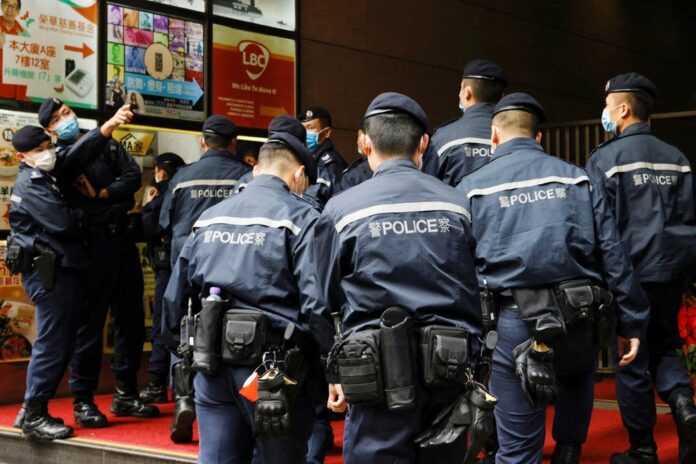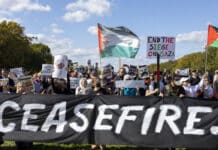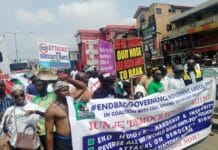Hong Kong continues to be embroiled in political and economic turmoil. Here is a round-up of major developments from the last few months
Socialist Action reporters
(This article was firstly published in January 2022)
Media crackdown
In December, the police raided the office of Stand News, one of the few remaining anti-government liberal news outlets in Hong Kong, arresting six of its current and former senior staff for “conspiracy to publish seditious publications”. Stand News announced its closure on the same day, removing all its videos and online content from its website.
This is the latest repression of press freedom since the government’s crackdown on Apply Daily in June 2021. Another independent online news outlet, Citizen News, also decided to shut down on 4 January. Hong Kong is now fully under direct Beijing rule. The CCP (so-called Communist Party dictatorship) and the counter-revolution will not tolerate any meaningful opposition in Hong Kong, all democratic rights are under attack, from freedom of protest to freedom of speech.
Fake election
On 19 December, Hong Kong held its first Legco (local legislature) election since the introduction of the National Security Law. Unlike previous elections where there were at least some elements of a free election, (50 percent of the seats were directly elected), this election was a complete farce. Only 22 percent of the seats were now directly elected, the rest were all hand-picked by the CCP and the capitalists. No meaningful opposition was allowed to take part, leaders of opposition parties were either all in prison or were disqualified by the government.
No wonder the election saw a historic low turnout, with only 30.2 percent voting compared to 58.3 percent in 2016. This was despite the government making it clear that anyone publicly calling for a “boycott” would be subject to three years of imprisonment. The low turnout was an active and conscious act by the masses to expose the farcical election. This was far from a victory for the regime, yet the result will not decisively change the counter-revolutionary direction in Hong Kong. Xi Jinping cannot compromise on the Hong Kong question as that would show weakness in the new Cold War and all the crises the regime is facing.
Mass exodus
Since the introduction of the National Security Law in June 2020, there has been a net outflow of over 100,000 people. The latest official data shows Hong Kong’s population saw negative growth of 1.2 percent last year, the lowest since records began in 1961 and even lower than during the emigration wave of the 1990s, before the handover. This is helped by the relaxation of immigration rules in several Western counties including the UK, Canada and Australia. Of course, these capitalist countries are not doing this for “human rights” or “democracy” in Hong Kong, but to support their Cold War agendas, as well as hoping to attract the wealthier layers of Hong Kongers.
Most of those leaving are from the middle class and professional layers: the top three sectors being finance, IT, and education. According to a survey in May 2021 by the now-disbanded Professional Teachers Union (almost all independent unions have now disbanded), 40 percent of teachers wanted to leave the sector due to “increasing political pressures”. Such a level of the professional drain will have serious socio-economic implications in the future – public services will be particularly affected. Last year, public hospitals saw a loss of 4.9 percent of doctors and 6.7 percent of nurses.
Partygate HK
Following China’s ‘dynamic zero-Covid’ strategy, Hong Kong has one of the world’s strictest lockdown policies in the world. The government once again in January closed down bars and cinemas, banning dine-in after 6 pm, after just one untraceable locally infected case was discovered. Entire blocks of residential buildings were placed under quarantine, trapping everyone inside for days. There were cases where food was inadequate and some people were not allowed to bring medicine in for their families.
The government has also maintained a four-person gathering ban in the public for almost two years, which is in reality a political ban on demonstrations. However, this did not seem to apply to the rich and elites of Hong Kong. A scandal broke out in January when over 200 people, including top government officials and newly elected lawmakers, attended a birthday party of an NPC member (China’s fake parliament). The incident only came to light when a Covid case was found to have attended the party, the government was forced to send all these “patriotic” rich people into quarantine camps. Clearly, there are two separate sets of rules – one for the average poor masses and one for the rich and elites.
Economic crisis
Political repression and the pandemic have certainly dealt a major blow to Hong Kong’s economy. The economy shrank by 6.1 percent in 2020, and despite the figure is expected to rebound by 6.4 percent in 2021, the city has far from recovered. In fact, Hong Kong’s economy was already in a slowdown before the pandemic, GDP dropped by 1.7 percent in 2019. Despite being one of the richest economies in the world, one-fifth of the population is still living in poverty. Unemployment is still relatively low (partly due to the emigration wave), but the mass exodus and professional drain will have a longer-term effect on the city. And as China’s economy, which Hong Kong is increasingly dependent on, enters into a deeper crisis the future of the latter will only become more volatile and gloomier. In a way, we can say that CCP and its counter-revolution have destroyed Hong Kong.




